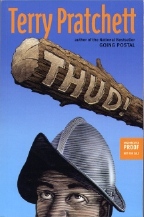Thud!
HarperCollins
US Hardcover First Edition
ISBN 0-060-81522-1
ISBN-13: 978-0-06-081522-6
Publication Date: 09-13-2005
373 Pages; $24.95
Date Reviewed: 10-24-05
Reviewed by: Rick Kleffel © 2005

REFERENCES
COLUMNS
|
|
|
Thud!HarperCollinsUS Hardcover First EditionISBN 0-060-81522-1ISBN-13: 978-0-06-081522-6Publication Date: 09-13-2005373 Pages; $24.95Date Reviewed: 10-24-05Reviewed by: Rick Kleffel © 2005 |
|
|
REFERENCES |
COLUMNS |
It's not just that he's got good at it. With his thirtieth Discworld novel, Terry Pratchett is way beyond "good at it." And it's not just that it's grown into its own world, with its own rules. Discworld is much more than a world unto itself. 'Thud!', Terry Pratchett's latest venture, is Terry Pratchett, utterly, perfectly at home, doing what Terry Pratchett has always done extremely well. Telling stories. And while 'Thud!' is certainly another knee-slapper, replete with Pratchett's trademarked humor, it's also much more. Pratchett has really come into his own as a mystery writer. He's approached it from as oblique an angle as one can possibly imagine. First he had to set up this world then tool about in it for more than a few years before he met up with Commander Vimes. But on those occasions when he visits with Vimes, he brings in a level of tension that he as a writer clearly, enthusiastically, enjoys. He drops his clues and he salts his herrings. He punches up his cop characters with the kind of glee that bespeaks of real passion, even, especially when those cop characters are also werewolves and vampires. And when he's setting up the readers for the thrill of discovery, he's setting himself up for it as well, discovering depths in his own text that emerge when a great writer does what a great writer should be doing. Telling stories.
'Thud!' begins with a bit of affirmative action, Discworld-style, and Commander Vimes is not happy about it. His City Watch has always been a conglomeration of all the inhabitants of the metropolis of Ankh-Morpork. But thus far, he's evaded including one group in his employ, the vampires. But now that final barrier is broken and he's forced to hire Sally. She's actually pretty good, and he'll need good help. Lord Vetinari has sent in an auditor to make sure the Watch isn’t needlessly wasting money. Mr. Pessimal, alas, is also good at his job. And this does not make Vimes' job any easier. Nor does the murder of a prominent rabble-rousing dwarf. In fact, this last event makes things positively difficult for Vimes, threatening to engulf the city in rioting and warfare between dwarfs and trolls. It's a question of religion and religious beliefs, the kind of fundamental difference that really can make a difference. Unless Vimes gets to the bottom of all this, there's a chance he might miss his nightly appointment to read his young son 'Where's My Cow?' Some things, after all, are very important.
Pratchett plays this out in a manner that satisfies readers of every type on every level. If you’re looking for Pratchett's humor and jokes, you'll find them and in fine form. Nicely topical, and just plain silly. What really drives this novel is, as one might hope, great characters. Vimes is the rock, the core, the unwavering stand-and-deliver center of the novel, and he's a delight in his stubbornness, his resolute intention to READ THAT STORY. Sally and Angua, the werewolf and vampire cops are a wonderful duet. Pratchett mutes their supernatural qualities by making them so integral to the characters that readers don’t really notice it so much, even when Sally transfigures into 120 or so bats. Pratchett's calculated the weight, so there's none of this "How do they get bigger or smaller?" silliness. Only great-joke silliness is allowed here, and there's a wonderfully rewarding character moment with Sally and Angua that is also an outstanding joke.
The rest of the cast is also outstanding. Pessimal has his moment, while the dwarfs, trolls and every extra seem fully formed, with lives that we would happily read about were they to be germane to Pratchett's plot. But Pratchett is one hundred percent on point here. This is a mystery at heart. The rabble-rouser's death is only the beginning of the reader's satisfaction. Pratchett leaves his clues about like a man who always writes mysteries, and his subject is much more than the death of a single troublemaker. While booksellers and his publishers want readers to think of Pratchett as a fantasy writer, he's far too hardheaded. Pratchett keeps his mystery well hidden, but there is no deus-ex-fantasia here, just the clues, the facts and a remarkably satisfying resolution.
Only when readers step back and take in the whole picture do Pratchett's larger concerns emerge. Pratchett is so comfortable in his milieu that he can write what he intends to be a nicely turned complex mystery and have it resonate far beyond his intentions. Discworld is real to the author and thus to his readers. His characters are true both to themselves and the world they inhabit. In this novel, just as in our world, the shapes of larger conflicts emerge from within smaller conflicts. It's more than a little ironic that Pratchett can manage to make his points without clobbering the reader over the bead with a big stick.
Of course, Pratchett is well beyond the big-stick stage with Discworld. His creation has taken on a life of its own. What that means for the casual reader, those of us who have not read every word he's written, but have only dipped our toes in now and again, is that 'Thud!' is a very nice book you can pick up and read without feeling like you're dipping into the middle of a series. It's more like a full glimpse of a very real world, filled with people you like doing interesting things. Pratchett has a story to tell us. And you know, in fact, he has got really, really good at it.